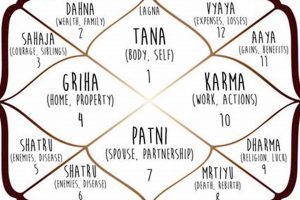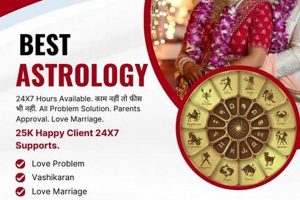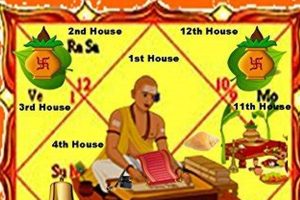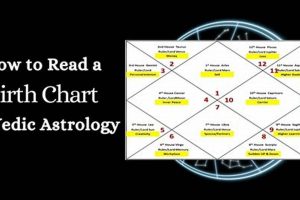Vedic astrology offers insights into the timing and nature of marital unions using planetary positions at the time of birth. This analysis considers various factors, including the seventh house (representing partnerships), the position and strength of Venus (signifying love and relationships), and other relevant planetary influences. For example, the placement of Mars might indicate the potential for conflict or passion within the marriage. The system utilizes a complex set of rules and interpretations to forecast potential challenges and opportunities in married life.
Historically rooted in ancient Indian scriptures, this practice aims to provide guidance and self-awareness regarding relationship dynamics. It can offer perspectives on compatibility, potential areas of growth, and karmic influences within partnerships. By understanding these potential patterns, individuals may gain tools to navigate their relationships with greater understanding and harmony.
Further exploration of this topic will cover key astrological concepts relevant to marital analysis, including Nakshatras (lunar mansions), planetary aspects, and the role of Dashas (planetary periods) in shaping relationship trajectories. It will also examine the different aspects of married life assessed, such as compatibility, progeny, and longevity of the union.
These tips offer guidance for individuals interested in exploring how Vedic astrology can provide insights into their marital paths. They highlight important considerations for approaching this ancient practice with clarity and purpose.
Tip 1: Consult with a Qualified Practitioner: Seek guidance from experienced and reputable Vedic astrologers. Expertise in interpreting birth charts and applying astrological principles is crucial for accurate and meaningful insights.
Tip 2: Provide Accurate Birth Details: Precise birth time, date, and location are essential for generating an accurate birth chart, the foundation of Vedic astrological analysis.
Tip 3: Understand the Scope of Predictions: Vedic astrology offers potential insights, not definitive pronouncements. Predictions should be viewed as guidance rather than fixed outcomes.
Tip 4: Focus on Self-Awareness and Growth: Use astrological insights to understand potential strengths and weaknesses within relationships. Focus on personal growth and developing healthy relationship dynamics.
Tip 5: Consider Remedial Measures: Vedic astrology often suggests remedies to mitigate potential challenges indicated in the birth chart. These might include gemstone recommendations, mantras, or specific rituals.
Tip 6: Integrate Astrological Insights with Practical Considerations: Combine astrological guidance with sound judgment and practical considerations when making relationship decisions. Astrology can inform, but not dictate, choices.
By thoughtfully considering these tips, individuals can gain valuable perspectives on their marital prospects and navigate relationships with greater understanding.
This exploration of Vedic astrology and its application to marital analysis provides a foundation for informed decision-making and personal growth within relationships.
1. Seventh House
The seventh house in Vedic astrology holds paramount importance in marriage prediction. It represents partnerships of all kinds, but its primary significance lies in its connection to marriage and the spouse. This house provides insights into the nature of the marital relationship, the qualities of the partner, and the overall trajectory of married life. The planetary influences within the seventh house, its ruler, and the aspects it receives, significantly impact the prediction. For instance, a benefic planet like Jupiter aspecting the seventh house often indicates a harmonious and prosperous marriage, while the presence of malefic planets might suggest challenges. A real-life example could be a person with Mars in the seventh house, potentially indicating a tendency for conflict or a highly energetic partner.
Further analysis delves into the specific characteristics signified by the seventh house’s planetary occupants. Venus in the seventh house, for example, often suggests a loving and affectionate partner, while Saturn might indicate a more practical and reserved spouse. The seventh house also offers clues about the timing of marriage. Planetary transits and periods (dashas) impacting the seventh house can often signal potential periods for marriage. For instance, the activation of the seventh house lord’s dasha could coincide with finding a life partner.
Understanding the seventh house provides crucial insights into the dynamics of marriage. While other factors contribute to a comprehensive analysis, the seventh house serves as a foundational element in Vedic astrological marriage predictions. It reveals not only the potential characteristics of the spouse but also the overall tone and direction of married life. Challenges indicated by the seventh house can be addressed through astrological remedies and conscious effort, highlighting the practical significance of this understanding.
2. Planetary Positions
Planetary positions at the time of birth form the cornerstone of Vedic astrological marriage predictions. Each planet’s placement within a specific sign, house, and its relationship (aspects) with other planets contributes unique influences. These positions reveal potential strengths and weaknesses, opportunities and challenges within the realm of marriage. For instance, the placement of Jupiter in the seventh house, the house of partnerships, often signifies a harmonious and prosperous marriage. Conversely, the presence of Saturn in the seventh house might indicate delays or challenges in finding a suitable partner, potentially demanding greater patience and effort in cultivating a lasting relationship. The influence of Mars on the seventh house could suggest a passionate but potentially volatile partnership dynamic.
Further analysis considers the combined impact of multiple planetary influences. Benefic planets like Jupiter and Venus generally suggest positive outcomes, while malefic planets like Saturn and Mars can signify potential difficulties. However, even challenging placements offer opportunities for growth and self-awareness. For example, while Saturn might indicate delays, it also signifies commitment and longevity, suggesting that a relationship, though slow to develop, could stand the test of time. A person with Venus conjunct Saturn might experience delayed marriage but potentially find a stable and committed partnership. Similarly, the influence of Rahu or Ketu, shadowy planets in Vedic astrology, can introduce unpredictable elements, suggesting unconventional or karmically significant unions.
Understanding planetary positions offers a nuanced perspective on marital dynamics. While these positions provide a framework for potential outcomes, they do not dictate destiny. Astrological insights should be used as tools for self-reflection and informed decision-making, not as rigid pronouncements of fate. By recognizing potential challenges and opportunities signified by planetary placements, individuals can proactively navigate their relationships with greater awareness and strive to build stronger, more fulfilling partnerships.
3. Venus' Influence
Venus holds significant sway in Vedic astrological marriage predictions, embodying love, relationships, beauty, and harmony. Its placement in the birth chart offers crucial insights into an individual’s romantic inclinations, the potential qualities of a partner, and the overall nature of married life. A strong and well-placed Venus generally indicates a harmonious and fulfilling marital experience, while a weaker or afflicted Venus might suggest challenges or delays in finding a suitable partner. For instance, Venus in the seventh house, the house of partnerships, is often considered highly auspicious for marriage, signifying a loving and devoted spouse. Conversely, Venus debilitated in Virgo might suggest difficulties in expressing affection or finding emotional fulfillment in a relationship. A practical example could be a person with Venus conjunct Mars, potentially indicating a passionate but potentially volatile relationship dynamic.
Further analysis considers the aspects Venus receives from other planets. Benefic aspects from planets like Jupiter enhance Venus’s positive influence, promising a harmonious and prosperous marriage. However, malefic aspects, such as from Saturn or Mars, could introduce challenges like delays, conflicts, or incompatibility. The sign in which Venus resides also plays a crucial role. Venus in Taurus or Libra, its own signs, generally bestows a natural inclination towards love and harmony in relationships. Venus in Scorpio, on the other hand, might suggest intense and transformative partnerships. Real-life examples include individuals with Venus in Pisces often exhibiting a dreamy and romantic approach to love, while those with Venus in Capricorn might demonstrate a more practical and reserved demeanor in relationships.
Understanding Venus’s influence provides valuable insights into the dynamics of marriage. While not solely deterministic, its position offers a framework for comprehending potential patterns and challenges. Recognizing these influences allows individuals to approach relationships with greater self-awareness and make informed choices. Addressing potential difficulties indicated by Venus’s placement through astrological remedies and conscious effort underscores the practical significance of this understanding. Ultimately, Venus’s influence in Vedic astrology serves as a guide for navigating the complexities of love and marriage, empowering individuals to cultivate fulfilling and lasting partnerships.
The Navamsa chart, often referred to as the D9 chart, holds a crucial position in Vedic astrological marriage predictions. It provides a microscopic view into the ninth house of the birth chart, which signifies dharma, luck, and higher purpose, and extends this lens to analyze the intricacies of married life. The Navamsa chart reveals the strength and dignity of planets impacting marriage, offering insights beyond the initial assessment of the birth chart. It helps determine the potential for a successful and fulfilling marriage, highlighting potential strengths and weaknesses within the relationship dynamic. For instance, a planet debilitated in the birth chart but exalted in the Navamsa chart can suggest initial challenges that eventually lead to a stronger, more resilient partnership. A real-life example could involve a person with Saturn in the seventh house of the birth chart, potentially indicating delays or difficulties in marriage. However, if Saturn is well-placed in the Navamsa chart, it suggests that while challenges may exist, the marriage ultimately proves stable and enduring.
Further analysis within the Navamsa chart focuses on the placement of the seventh lord from both the birth chart and the Navamsa chart itself. The placement and aspects received by Venus, the significator of love and marriage, also gain prominence in the Navamsa chart. This detailed examination allows astrologers to assess the overall quality of the marital relationship, including potential compatibility issues, emotional dynamics, and the karmic influences shaping the union. For example, if the seventh lord of the birth chart is placed in a challenging house in the Navamsa chart, it might suggest difficulties in maintaining harmony within the marriage. The Navamsa chart also offers insights into the characteristics of the spouse. The sign in which the seventh lord is placed in the Navamsa chart can often describe the spouse’s temperament and personality. A person with the seventh lord in Gemini in the Navamsa chart, for instance, might have a spouse who is communicative and intellectually inclined.
Understanding the role of the Navamsa chart provides a deeper, more nuanced understanding of marriage potential. It acts as a crucial tool for assessing the long-term prospects of a relationship, moving beyond initial impressions to reveal the underlying dynamics. While the birth chart sets the stage, the Navamsa chart adds depth and detail to the narrative of marriage, offering valuable insights for navigating the complexities of long-term partnerships. By recognizing potential challenges and strengths indicated within the Navamsa chart, individuals gain the opportunity to approach their relationships with greater awareness and build stronger, more fulfilling marriages. It helps to discern the true potential and likely trajectory of a marital union, highlighting areas requiring attention and offering a roadmap for fostering a lasting and meaningful connection.
5. Dasha Analysis
Dasha analysis forms a cornerstone of Vedic astrological marriage predictions. It reveals the unfolding of karmic patterns over time, providing a framework for understanding the timing and nature of significant life events, including marriage. By analyzing the planetary periods (dashas) and sub-periods (bhuktis) active during a person’s life, astrologers can identify potential periods conducive to marriage, as well as periods that might present challenges or delays. This understanding of timing allows individuals to approach relationships with greater awareness and make informed decisions.
- Planetary Periods (Dashas):
Each planet rules a specific dasha of varying lengths, influencing the overall themes and experiences during its reign. For example, a Venus dasha often signifies a period focused on relationships, beauty, and pleasure, increasing the likelihood of marriage or significant romantic developments. A Jupiter dasha generally brings opportunities for growth, expansion, and good fortune, potentially creating a favorable environment for marriage. Conversely, a Saturn dasha might signify a period of challenges, delays, or responsibilities, potentially delaying marriage or requiring more effort in building a stable relationship. A real-life example could involve a person experiencing marriage during a Venus-Jupiter dasha combination, potentially signifying a harmonious and prosperous union.
- Sub-Periods (Bhuktis):
Within each major planetary period (dasha), there are sub-periods (bhuktis) ruled by other planets. These bhuktis further refine the influences of the main dasha, creating specific windows of opportunity or challenge. For example, a Venus dasha combined with a Jupiter bhukti creates a highly auspicious period for marriage, amplifying the positive influences of both planets. Conversely, a Venus dasha with a Saturn bhukti might introduce delays or obstacles in relationships, despite the overall focus on love and partnership during the Venus dasha. A person experiencing a delay in marriage during a Venus-Saturn period might find that the situation improves when the bhukti changes to a more favorable planet.
- Transits and Dashas:
The interplay between planetary transits and the ongoing dasha system provides further insights into timing and potential outcomes. Favorable transits occurring during a supportive dasha can significantly amplify the likelihood of marriage. For example, a Jupiter transit over the seventh house during a Venus dasha creates a strong indication of marriage. Conversely, challenging transits during an already difficult dasha might exacerbate potential relationship problems. A person experiencing a Saturn transit over the seventh house during a Saturn dasha might face significant challenges in their relationships.
- Predictive Techniques:
Astrologers employ various predictive techniques within dasha analysis to pinpoint potential marriage periods. These include assessing the strength and placement of the seventh lord (ruler of the house of partnerships) and Venus within the context of the active dasha and bhukti. They also consider the transits of these and other relevant planets. For instance, the activation of the seventh lord’s dasha, particularly if the lord is well-placed, significantly increases the likelihood of marriage. A person experiencing their seventh lord’s dasha combined with favorable transits to the seventh house has a high probability of marriage during that period.
By integrating dasha analysis with other astrological factors, Vedic astrology offers a comprehensive understanding of marital timing and potential outcomes. This system provides a roadmap for navigating the complexities of relationships, empowering individuals to approach marriage with greater awareness and make informed decisions based on the unfolding karmic patterns indicated by their birth chart.
Frequently Asked Questions
This section addresses common inquiries regarding the application of Vedic astrology to marriage prediction.
Question 1: How accurate are Vedic astrological marriage predictions?
Vedic astrology offers potential insights, not guaranteed outcomes. Accuracy depends on the astrologer’s expertise and the individual’s openness to self-reflection and growth. Predictions serve as guidance, not predetermined destinies.
Question 2: Can Vedic astrology predict the exact timing of marriage?
While specific planetary periods can suggest increased likelihood, pinpointing the exact date remains challenging. Astrology offers timeframes, not specific dates, for life events.
Question 3: What if my birth time is unknown? Can marriage still be predicted?
Rectification techniques can estimate birth time, but predictions might be less precise. Other divisional charts and astrological tools can still offer valuable insights.
Question 4: Can Vedic astrology determine marital compatibility?
Astrology assesses potential compatibility based on planetary positions. However, relationship success depends on mutual effort, understanding, and shared values, not solely astrological compatibility.
Question 5: Can Vedic astrology predict divorce?
Planetary combinations can suggest potential challenges within a marriage. However, divorce is a complex decision influenced by numerous factors beyond astrological indicators.
Question 6: What are the limitations of Vedic astrological marriage predictions?
Predictions offer probabilities, not certainties. Free will, individual choices, and external circumstances play significant roles in shaping life events, including marriage.
Understanding these key considerations facilitates a more informed approach to utilizing Vedic astrology for gaining insights into marriage.
Exploring these questions further can lead to a deeper understanding of the role of Vedic astrology in relationship analysis.
Marriage Prediction
This exploration of marriage prediction through Vedic astrology has illuminated key components of this ancient practice. From the significance of the seventh house and planetary positions to the nuanced influence of Venus and the insights provided by the Navamsa chart and Dasha analysis, the multifaceted nature of this predictive system becomes evident. Each element contributes to a comprehensive understanding of potential marital dynamics, highlighting opportunities for growth and self-awareness within relationships.
While marriage prediction within Vedic astrology offers valuable insights, it encourages a proactive approach to relationships rather than a deterministic view of fate. By understanding potential challenges and strengths indicated within the birth chart, individuals gain the opportunity to navigate their relationships with greater consciousness and cultivate fulfilling, long-lasting partnerships. Further research and consultation with qualified astrologers can deepen understanding and provide personalized guidance. The ultimate power to shape one’s destiny, including the realm of marriage, rests on informed choices and conscious actions.







